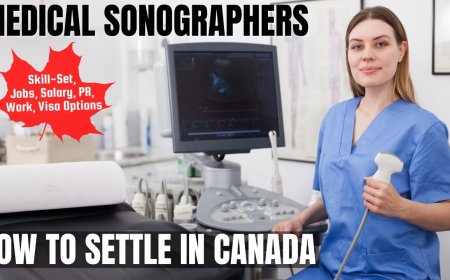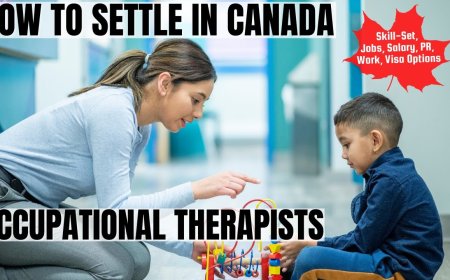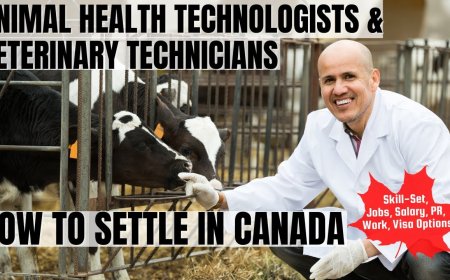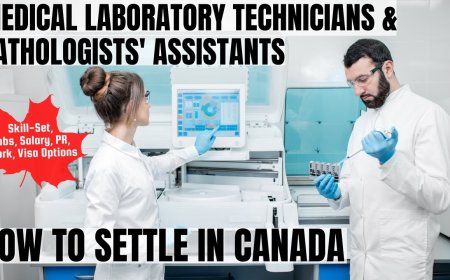Other assisting occupations in support of health services Canada Immigration Overview: Key Insights on Salaries, Employment, and Regional Advantages
Welcome to the pathway to Canada immigration for skilled professionals and trade workers. This guide is specifically tailored for Other assisting occupations in support of health services looking to work and settle in Canada, offering a deep dive into the essential aspects of immigration and employment in this field.
Introduction
Canada offers promising career opportunities for individuals in the field of Other assisting occupations in support of health services, with a National Occupation Classification code (NOC Code) of 3414. In this article, we will explore the profile description, main job duties, education and license requirements, required skills, median age and retirements, salary details, and possible visa options for individuals looking to pursue a career in this field in Canada. Whether you are a Canadian resident or an international immigrant, this article will provide valuable information on the career and immigration prospects for Other assisting occupations in support of health services in Canada.
What is the Profile Description of a Other assisting occupations in support of health services as per the Canadian National Occupation Classification (NOC) Standards?
Workers in this unit group play a crucial role in providing support and assistance to healthcare professionals and staff. They can be found working in various settings such as hospitals, medical clinics, nursing homes, pharmacies, and laboratories. Their responsibilities may include tasks such as helping with administrative duties, providing patient care, maintaining equipment, and performing other important tasks to ensure the smooth operation of healthcare facilities.
What are the Main Job Duties of a Other assisting occupations in support of health services in Canada?
- Assist orthopedic surgeons by applying and adjusting casts, splints, and bandages, as well as maintaining traction equipment
- Provide patient care by cleaning and dressing wounds, removing casts and sutures, and instructing patients and their families on orthopedic matters
- Support rehabilitation activities for patients by preparing equipment and supplies, as well as assisting in exercises and therapy as directed
- Operate optical equipment to grind, cut, and fit lenses for eyeglasses, while also maintaining and repairing laboratory machinery
- Assist pharmacists with packaging and labelling pharmaceutical products, maintain inventory records, and operate sterilization equipment to clean and disinfect medical supplies
What are the Education, Certifications, and Licensing Requirements to Work as Other assisting occupations in support of health services in Canada?
To work as an Orthopedic Technologist, individuals typically need to have a high school diploma and complete several months of on-the-job training or a college orthopedic technologist program. Employers may also require registration with the Canadian Society of Orthopaedic Technologists. For Health Care Assistants, including medical therapy assistants, completion of health care courses or short-term college programs related to their work may be necessary. This can include programs focused on recreational therapy. Pharmacy Aides usually need to have a high school diploma and complete several months of on-the-job training. Individuals looking to work as Sterile Processing Technicians typically need a high school diploma and complete a six- to nine-month sterile processing college program. Generally, most assisting occupations in support of health services require at least a high school diploma and several months of on-the-job training.
What Essential Skills are Required for Other assisting occupations in support of health services to succeed in Canada?
Success in the profession of other assisting occupations in support of health services requires a range of essential skills. These include the ability to assist healthcare professionals by laying out surgical instruments, preparing solutions for preservation of specimens, and removing organs and tissue specimens from bodies in a morgue as directed by a pathologist. Other key skills include cleaning and sewing up bodies for release to funeral homes, applying and adjusting casts, splints, and bandages, and cleaning and dressing wounds. Additionally, individuals in these roles must be able to remove casts, sutures, and pins, set up and dismantle equipment, record information about donors, label and process donated blood, and provide post-donation care and donor reaction care. Furthermore, proficiency in monitoring donors throughout procedures, maintaining cleanliness of collection areas, operating and maintaining sterilization equipment, and positioning patients for treatments by a chiropractor or machine is crucial. Other essential skills include recording vital signs, assisting with patient health education, processing claims such as health insurance or workers' compensation, connecting treatment machines to patients as directed by a chiropractor, managing routine office functions, compounding, packaging, and labeling pharmaceutical products, maintaining prescription records and inventories of medications, and preparing and maintaining equipment and supplies. Ultimately, success in this profession relies on a combination of technical expertise, attention to detail, and strong communication and organizational skills.
What is the Median Age and Retirement Age for Other assisting occupations in support of health services in Canada?
The median age and average retirement age of skilled professionals working as Other assisting occupations in support of health services are not available. This may be due to a lack of specific data on this particular occupation or the diversity of individuals within this category. However, it is important to recognize that individuals working in these roles play a crucial support role in providing quality healthcare services to patients. Despite the lack of specific age data, it is clear that these professionals are essential members of the healthcare team and contribute significantly to the overall well-being of patients.
How many job openings exist for Other Other assisting occupations in support of health services in Canada, and what's their provincial distribution?
In Canada, there are a total of 118 job openings for the profile of Other assisting occupations in support of health services. The province of Québec has the highest number of job openings with 66 positions available, followed by British Columbia with 28 openings. Ontario has 15 job openings, while Alberta, New Brunswick, Saskatchewan, Manitoba, and Nova Scotia have 3, 2, 2, 1, and 1 job openings respectively. This data indicates that Québec has the maximum job openings for this role, while Nova Scotia has the minimum job openings. Overall, there are numerous opportunities available across various provinces in Canada for individuals looking to work in the healthcare support services field.
What is the hourly wage or salary of Other assisting occupations in support of health services in different Provinces of Canada?
The profession of Other assisting occupations in support of health services in Canada offers varying wage levels across different provinces. In British Columbia, the wages range from a low of $15.20 to a high of $24.85, with a median wage of $19.80. Alberta also offers a competitive wage range, with the lowest wage at $16.00, a median wage of $21.75, and a high wage of $26.00. On the other hand, Saskatchewan has the highest wage range, with the lowest wage at $13.80, a median wage of $20.83, and the highest wage at $28.00. Manitoba, Ontario, Quebec, New Brunswick, Nova Scotia, Prince Edward Island, and Newfoundland and Labrador all offer competitive wage ranges as well, providing opportunities for workers in this profession to earn a decent living across the country. It is evident that the wages for Other assisting occupations in support of health services vary significantly by province in Canada, reflecting the local economic conditions and demand for healthcare support services.
What are the various visa options available for Other assisting occupations in support of health services migrating to Canada?
Other assisting occupations in support of health services such as medical laboratory technicians, pharmacy assistants, and dental assistants are currently in high demand in Canada. These occupations fall under the Healthcare Occupations Category, making them eligible for Category based Express Entry Invitation draws for Canadian PR. The Express Entry Visa Category, Provincial Nominee Programs, and Employer Sponsored Work Visas are all pathways through which individuals in these occupations can apply for permanent residency in Canada. Additionally, there may be other visa options currently open for this profile. To learn more about these options and discuss your specific case in detail, book an appointment with our immigration professionals today.
Have Questions or Need Assistance?
If you have any queries or require assistance with your immigration plans, we're here to help. Our experienced immigration consultants are ready to provide personalized guidance tailored to your specific needs.
Don't hesitate to reach out and schedule an appointment today. Whether you're seeking clarification on immigration processes, exploring visa options, or need support with documentation, we're dedicated to assisting you every step of the way.
Book an appointment with our team to discuss your immigration goals and receive expert guidance for your journey to Canada.
What's Your Reaction?
 Like
0
Like
0
 Dislike
0
Dislike
0
 Love
0
Love
0
 Funny
0
Funny
0
 Angry
0
Angry
0
 Sad
0
Sad
0
 Wow
0
Wow
0






































































